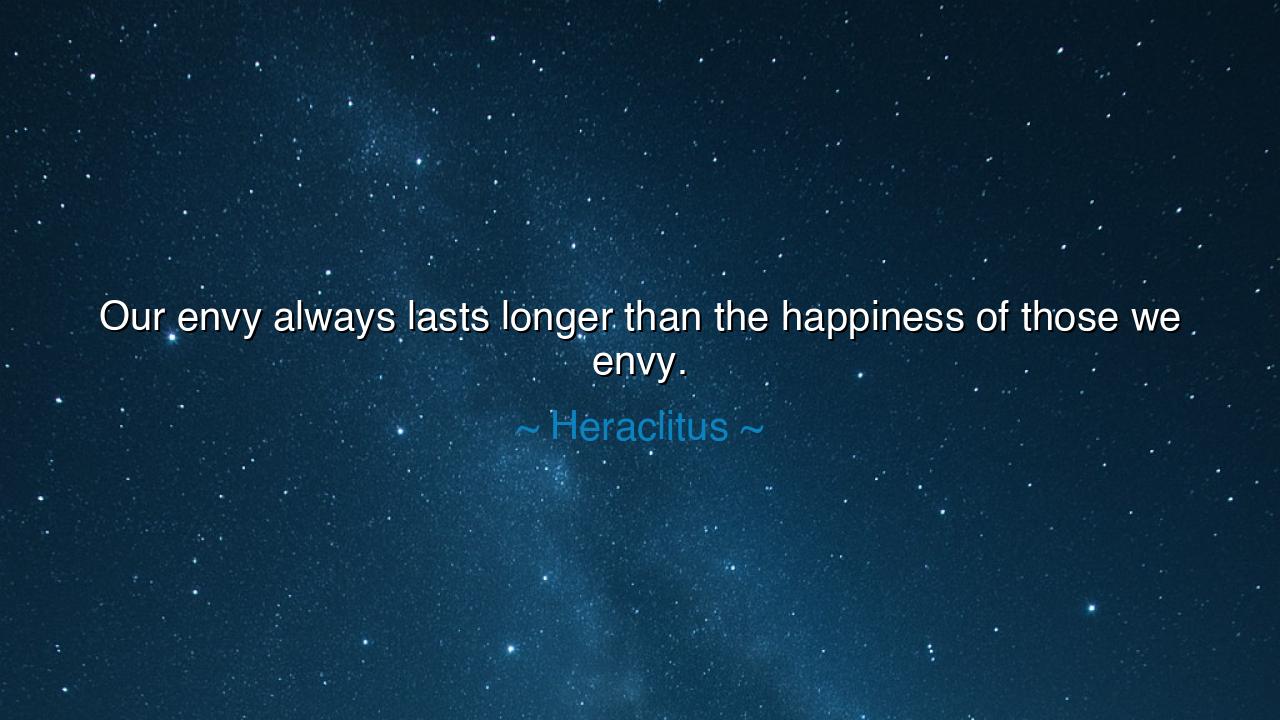
Our envy always lasts longer than the happiness of those we envy.






“Our envy always lasts longer than the happiness of those we envy.” So spoke Heraclitus, the weeping philosopher of Ephesus — the one who saw the world as a river, ever-flowing, never the same twice. In these few words, he unveiled a truth as old as humankind itself: that envy is the shadow of the soul, clinging to us even after the light that cast it has faded. The happiness we covet in others is fleeting, but the envy it stirs in us endures like a poison that feeds upon the heart.
Heraclitus, who taught that change is the essence of life, reminds us here that human emotions are often bound not to the rhythm of reality, but to illusion. The joy of others rises and falls like a wave; it appears brilliant for a moment, then sinks into silence. But envy — that restless, bitter flame — lingers. It burns long after the moment of comparison has passed, for it feeds not on the joy of others but on our own dissatisfaction. It is the fire that consumes without warming, the hunger that grows the more it is fed.
Consider the story of Caius Cassius, the Roman senator whose envy of Julius Caesar drove him to treachery. Cassius could not endure another man’s glory. He saw Caesar’s ascent not as a triumph for Rome but as an insult to himself. And though the happiness of Caesar — the feasts, the honors, the cheers of the people — lasted but a season, Cassius’s envy endured even beyond Caesar’s death. The tyrant fell, yet Cassius found no peace. For envy destroys not its object, but its bearer. The envied man’s joy passes with time; the envier’s torment renews itself each dawn.
This is the nature of envy: it is born from comparison, and comparison is the thief of serenity. It turns the eyes outward when wisdom commands that they turn inward. The envious man measures his worth by the fortune of others and, finding himself lacking, multiplies his misery. Meanwhile, the one he envies is often unaware, his happiness brief and imperfect. Thus, the envious live longer in sorrow than the joyful live in gladness — not because the world is unjust, but because they refuse to let their hearts rest.
In contrast, the wise cultivate contentment, that quiet antidote to envy. To be content is not to be blind to others’ blessings, but to recognize the fleeting nature of all things. The man who understands impermanence rejoices in another’s joy as in his own, knowing both will fade like dew before the sun. The philosopher, the artist, the saint — each learns that life’s treasures lose their meaning when hoarded but gain it when shared. The heart at peace does not measure, it marvels.
Think of Epictetus, born a slave, lame and poor, yet freer than emperors in his spirit. He saw others clothed in silks and surrounded by gold, yet he envied none. “What is yours,” he said, “is the power to govern your mind.” His happiness came not from possessions, but from mastery over the self. The world could strip him of everything, yet he remained rich, for he did not measure life by the scales of comparison. His peace outlasted the fleeting triumphs of the powerful — for envy cannot live where gratitude dwells.
And so, my children, remember this truth: the happiness of others passes like the wind, but envy endures like rust upon the soul. Guard yourself from it as from a creeping sickness. When you feel its stirrings, do not feed it with thought, but silence it with praise. Bless the fortune of others, and you will disarm the bitterness within yourself. For in rejoicing at another’s joy, you double the beauty of the world; in envying it, you halve your own.
Let your heart be as a still lake — clear, deep, and undisturbed by passing reflections. The world will parade its glories before you: gold, power, beauty, acclaim. Look upon them, admire them, but do not chain your spirit to them. For those who live without envy dwell in timeless joy. They rise above the fleeting happiness of others and find peace in the eternal — the peace of those who, like Heraclitus, understand that the river of life flows ever onward, and that to envy is to drown, while to accept is to float.






AAdministratorAdministrator
Welcome, honored guests. Please leave a comment, we will respond soon